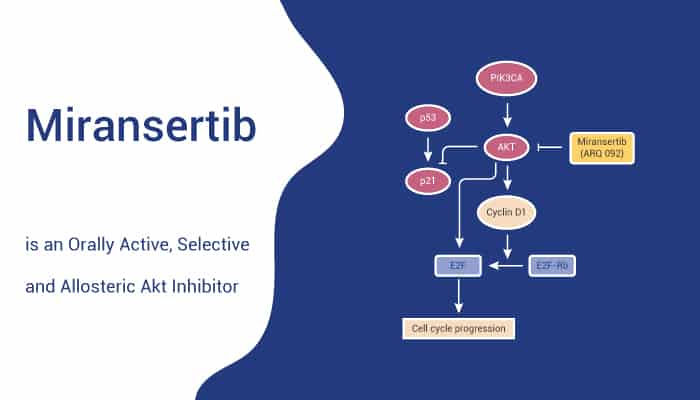The AGC kinases AKT1, AKT2, and AKT3 are key mediators of the PI3K/AKT/mTOR signaling pathway. Additionally, AKT promotes diverse physiological processes, including cell proliferation,
migration, and protein synthesis, et al.
In this article, we will introduce an allosteric Akt inhibitor, Miransertib. As a potent inhibitor, Miransertib exhibits IC50s of 2.7 nM, 14 nM, and 8.1 nM for Akt1, Akt2, Akt3, respectively.

Firstly, in vitro, in a large panel of cell lines derived from various tumor types. Besides, it is also a potent AKT1-E17K mutant protein inhibitor. Miransertib shows potent anti-proliferative activity in cell lines containing PIK3CA/PIK3R1 mutations compared to those with wild-type (wt) PIK3CA/PIK3R1 or PTEN loss. It shows excellent inhibition of p-Akt (S473) and p-Akt (T308) in both AN3CA and A2780 cells. The inhibition of the downstream protein p-PRAS40 (T246) is observed with Miransertib (IC50=0.31 μM).
Next, in vivo in a PK study. Miransertib shows good absolute oral bioavailability in rats and monkeys with F% of 62% and 49%, respectively. The half-life is longer in rats compared to monkeys with t1/2 values of 17 h in rats versus 7 h in monkeys. The Cmax is 198 ng/mL and 258 ng/mL and the AUCinf is 5496 h•ng/mL and 2960 h•ng/mL in rats and monkeys, respectively.
Miransertib has the potential for PI3K/AKT-driven tumor research. It inhibits tumor growth in a human xenograft mouse model of endometrial adenocarcinoma. Besides, Miransertib oral at a dose of 100 mg/kg results in 99%, 95%, and 58% reductions in p-AKT (S473), p-AKT (T306), and p-PRAS40 (T246), respectively in tumor-bearing mice.
Miransertib is effective against Leishmania.
The Leishmaniasis parasites of the genus usually lead to Leishmaniasis. However, there exists no effective vaccine against leishmaniasis, and drugs are the only available tools to treat and control leishmaniasis. The development of parasite resistance to drugs currently in use is a concern.
As a result, this compound is markedly against intracellular amastigotes of L. donovani or L. amazonensis-infected macrophages. Additionally, Miransertib enhances mTOR-dependent autophagy in Leishmania-infected macrophages.
In summary, Miransertib is an orally bioavailable AKT inhibitor and has the potential for endometrial adenocarcinoma and Leishmania research.
Reference:
[1]. Lapierre JM, et al. J Med Chem. 2016 Jul 14;59(13):6455-69.
[2]. Devki Nandan, et al. PLoS One. 2018 Nov 6;13(11):e0206920.